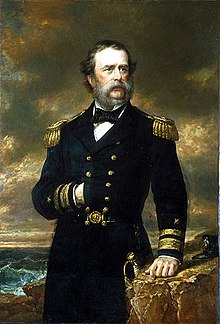Samuel F. Du Pont
| Samuel Francis Du Pont | |
|---|---|

Samuel Francis Du Pont by Daniel Huntington, 1867–68, oil on canvas, National Portrait Gallery, Washington, D.C.
|
|
| Born |
September 27, 1803 Bayonne, New Jersey |
| Died | June 23, 1865 (aged 61) Philadelphia, Pennsylvania |
| Place of burial | Greenville, Delaware |
| Allegiance |
|
| Service/branch |
Union Navy |
| Years of service | 1815–1865 |
| Rank |
|
| Commands held |
Warren Grampus Perry Congress Cyane Minnesota South Atlantic Blockading Squadron |
| Battles/wars |
Mexican–American War American Civil War |
| Relations | Du Pont family |
Samuel Francis Du Pont (September 27, 1803 – June 23, 1865) was a Rear Admiral in the United States Navy, and a member of the prominent Du Pont family. In the Mexican–American War, Du Pont captured San Diego, and was made commander of the California naval blockade. Through the 1850s, he promoted engineering studies at the United States Naval Academy, to enable more mobile and aggressive operations. In the American Civil War, he played a major role in making the Union blockade effective, but was controversially blamed for the failed attack on Charleston, South Carolina in April 1863.
Du Pont was born at Goodstay, his family home at Bergen Point (now Bayonne), New Jersey, the fourth child and second son of Victor Marie du Pont and Gabrielle Joséphine de la Fite de Pelleport. His uncle was Eleuthère Irénée du Pont, the founder of E.I. du Pont de Nemours Company, which began as a gunpowder factory and today is a multinational chemical corporation. (Samuel was the only member of his generation to use a capital D.) Du Pont spent his childhood at his father's home, Louviers, across the Brandywine Creek from his uncle's estate and gunpowder factory, Eleutherian Mills, just north of Wilmington, Delaware. He was enrolled at Mount Airy Academy in Germantown, Pennsylvania, at age 9. However, his father was unable to fund his education because of his failing wool mill, and he was encouraged to instead enlist in the U.S. Navy. His family's close connections with President Thomas Jefferson helped secure him an appointment as a midshipman by President James Madison at the age of 12, and he first set sail aboard the 74-gun ship of the line Franklin out of Delaware in December 1815.
...
Wikipedia
